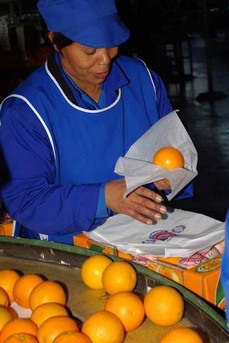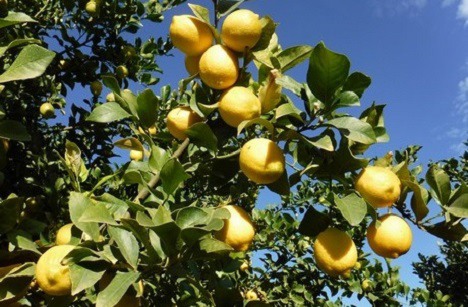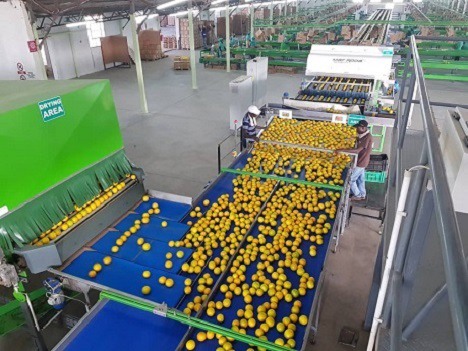 In an era that decries food waste and heavy chemical spraying, the European Union's intractable stance on the cosmetic disease citrus black spot (CBS) is an indefensible piece of politicking which the South African citrus industry will no longer accept.
In an era that decries food waste and heavy chemical spraying, the European Union's intractable stance on the cosmetic disease citrus black spot (CBS) is an indefensible piece of politicking which the South African citrus industry will no longer accept.
Even more so when it is financially crippling a citrus industry: it costs R3.7 billion (178 million euro) in chemicals to be sprayed and other measures in CBS and false codling moth-prone citrus orchards in the north and east of the country every year.
“The South African citrus industry is with its back to the wall,” says Deon Joubert, the Citrus Growers’ Association of Southern Africa’s envoy to the European Union.
“Citrus black spot has never spread to Europe (nor to the Western Cape, for that matter) in over a hundred years of South African citrus exports to Europe. It is substantiated by Westerdijk Fungal Biodiversity Institute in the Netherlands finding CBS spores in leaves of citrus planting material at various sites in Southern Europe in 2017," he says.
"The citrus black spot fungus is widely present in citrus material, and it supports South Africa and the rest of the world’s position that the climate in Southern Europe, as in the Western Cape and California, does not support the development of symptoms.”
CBS spores on SA citrus stand no chance of making it alive to Europe
“We’re busy writing ourselves off – for what? For at worst a purely cosmetic issue that doesn’t affect the beauty of the fruit nor the excellent eating quality manifested by 60% rise in imports by European customers over the last 8 years. There’s no way we can continue to go along with the unilateral way in which the CBS issue has been handled over the past ten years during which we’ve bent over backwards to comply with the ever stringent regulations presented to us by the European Union.”
He adds that to treat CBS cosmetically is easy but to spray repeatedly to deliver fruit consistently clear in terms of EU regulations is suicidal and futile, as the fruit itself is not a pathway for the disease.

On top of the intensive spray programmes followed in South African orchards against citrus black spot, conventional citrus also move through disinfectant baths and they are mostly waxed, processes which CBS fungal spores do not survive.
“The EU is in effect asking us to spray dead spores which, they themselves conceded in 2015 and 2016, cannot transmit citrus black spot. It is like feeling threatened by a dead dog’s bite. It is a fallacy in reasoning with which they’re holding us to ransom.”
The fungus which, if not treated, can cause unsightly spots on citrus rind has become the alpha and omega of spray programmes on summer rainfall citrus farms in South Africa – and next year the chemical mainstay of this incessant spray programme (Mancozeb) may no longer permissible.
“Complying with EU regulations on CBS will therefore only become more difficult when we can’t use Dithane [brand name of active ingredient Mancozeb] anymore. There is no commercially viable alternative to Dithane.”
He reiterates that the United States has accepted that CBS is present in Florida orchards, but it has never spread to California, proving South Africa’s point that the fruit is not a pathway for transmission.
The United States also imports citrus from other CBS areas, like Argentina and Uruguay, which they feel pose no threat to their domestic citrus industry.
False positives generated by poor testing methods
The recent interceptions of alleged citrus black spot on citrus from South Africa’s winter rainfall region by Portuguese inspection agency has been a final straw for the industry.
The CGA believes that the laboratory techniques used to confirm CBS employed by some European inspection agencies are inaccurate. Live CBS fungal spores on fruit are what laboratories should, in fact, be looking for through spore culture over several weeks - a point on which the EU agreed in the past, but which is no longer the case in practice.
“We know that the EU no longer follows the principle of looking for live spores. They are merely confirming the presence of dead spores – and for that matter, not even accurately,” he says.
It reminds them, Deon remarks, of last year’s claim of two cases of CBS found in Belgium on Floridian citrus from an area not reported to have CBS. It was successfully contested by America and consequently set aside by EU authorities.
“So if the EU can find false positives on CBS and then, upon appeal, withdraws it, it casts serious doubt on the accuracy of their CBS testing procedure. We maintain that the EU is not necessarily accurately isolating CBS through their laboratory procedures. Perhaps they are detecting Alternaria and hail damage, who knows. We’ve asked to see the detailed procedure they followed to pick up CBS on fruit from the Western Cape but the EU has to date not shared its laboratory details and procedures.”
He claims that there are currently several cases of false positives found by EU inspection agencies.

What is the red line on CBS?
“The EU needs to be consistent in dealing with CBS which does not only affect South Africa,” he maintains and he gives the example of citrus from elsewhere in the Southern Hemisphere where 112 interceptions occurred before the EU closed their market to them in 2020.
“We’re now standing at 25 so-called non-compliances - of which a big number is contested - and there are threats of closing the market, when for another third country was only closed at 112 non-compliances.”
South Africa has asked the EU to clearly state their non-compliance threshold at which the country could be barred from exports on the grounds of CBS – but has not received any response on this point either.
“We can’t continue to criminalise CBS. The EU is the only bloc in the world to do this. We believe we have an even better case on CBS than on FCM at the World Trade Organisation,” he says. “The EU can’t be referee and play in the game, which, we believe, is why this matter is serious enough to be heard by the World Trade Organisation.”
Argentina, Uruguay and the United States are fully aligned with South Africa’s scientific position on citrus black spot, according to him.
“They feel exactly the same as us, and if we open a World Trade Organisation dispute for CBS, who knows, other countries might join as respondents. You cannot criminalise a disease just for political purposes.”
The CGA understands that their dilemma in Europe and the request for a second, CBS-focused WTO dispute was discussed at cabinet level this week.
 For more information:
For more information:
Deon Joubert
Citrus Growers' Association
Tel: +27 31 765 2514
Email: info@cga.co.za
